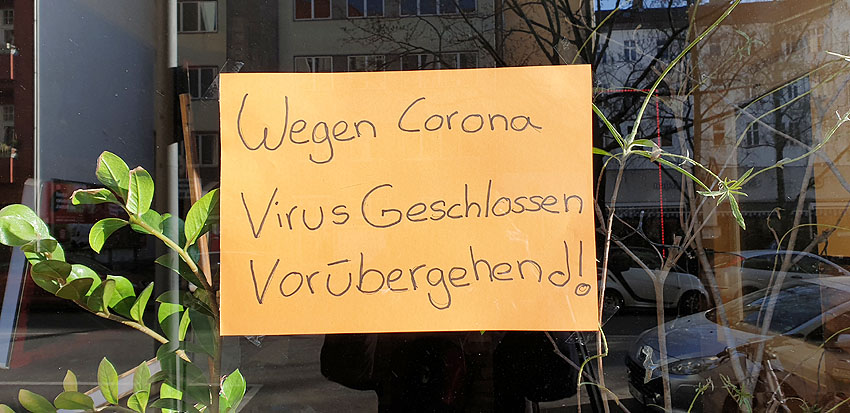Chancellor Angela Merkel has announced updated measures, some of which will remain in place “until further notice.” But what exactly is changing for residents of Germany — and what did Germany’s many state leaders want?
German Chancellor Angela Merkel on Wednesday announced the next phase of the country’s plan to combat the spread of the novel coronavirus and its resulting disease, COVID-19. These include the slow re-opening of schools and smaller shops, as long as physical distancing and strict hygiene measures remain in place.
Merkel opened her press conference remarks by thanking the country’s inhabitants for adhering to guidelines and extending her sympathy to everyone whose lives have been directly touched by the virus, including the 3,606 people who thus far are known to have died due to COVID-19 in Germany.
The chancellor warned, however, that “we have to live with this until there is a medicine or a vaccine” that can stop it. She said that Germany’s current triumphs — a healthcare system not completely overwhelmed, a number of infections that has plateaued and a number of deaths that has passed its apparent peak — constitute only a “delicate, intermediate success.”

The new regulations are as follows:
- Retailers with trading floor smaller than 800 square meters (8,610 square feet) will be allowed to open under the current physical distancing rules on April 20.
- Schools will slowly re-open their doors on May 4, with pupils in their last years of primary and secondary school having the priority. Schools that re-open must have a strict hygiene plan in place.
- Hair salons can resume business on May 4 if strict protective measures are observed.
- The ongoing rule that individuals may only meet with one person outside their household remains in place, as well as the rule about keeping a minimum of 1.5 meters (5 feet) away from others.
- Large events, such as sports and concerts, will remain banned until August 31.
- Bars, restaurants, day care centres, theatres, and cinemas will stay closed until further notice.
- Religious gatherings are also cancelled for the foreseeable future.
- Protective masks are “strongly recommended,” but not mandatory, in shops and on public transportation.
- Strict controls at Germany’s borders will stay in place for at least 20 more days.
Merkel added that “small steps” towards normality are only possible if the health authorities are able to follow the chain of infection better, mentioning an app that has been suggested as a way to surveil the movements of recovered and healthy individuals.
Consulting with scientific experts
The press conference followed two days of consultations on the part of the chancellor, who spoke with scientific experts on Tuesday and the leaders of Germany’s 16 states on Wednesday. Under Germany’s federal system, schools and health authorities are controlled at the state level, and with many states having drastically different levels of infections, there were many different needs to consider for the national response.
For example, Bavarian State Premier Markus Söder, who sat next to Merkel at the press conference, had stressed that kindergartens and primary schools stay shut. Winifried Kretschmann, the leader of Baden-Württemberg, where economically key automakers Porsche and Mercedes are headquartered, said in a policy paper ahead of the meeting that avoiding a second lockdown was of paramount importance for economic fortunes.
According to the Robert Koch Institute (RKI), Germany’s disease control authority, while the number of new infections has plateaued, it has levelled off at too high a number for regulations to be relaxed. The Health Ministry in Berlin has said that the country currently has 10,000 intensive care beds and ventilators available, which the RKI confirmed is sufficient to handle the crisis if the number of new infections does not significantly increase.
Germany has recorded 132,000 cases of COVID-19, with some 72,000 patients having already recovered from the virus. According to a YouGov Deutschland poll conducted on Tuesday, a majority of Germans are in favour of keeping social distancing measures in place for the time being.
© DW
 THE AFRICAN COURIER. Reporting Africa and its Diaspora! The African Courier is an international magazine published in Germany to report on Africa and the Diaspora African experience. The first issue of the bimonthly magazine appeared on the newsstands on 15 February 1998. The African Courier is a communication forum for European-African political, economic and cultural exchanges, and a voice for Africa in Europe.
THE AFRICAN COURIER. Reporting Africa and its Diaspora! The African Courier is an international magazine published in Germany to report on Africa and the Diaspora African experience. The first issue of the bimonthly magazine appeared on the newsstands on 15 February 1998. The African Courier is a communication forum for European-African political, economic and cultural exchanges, and a voice for Africa in Europe.


































